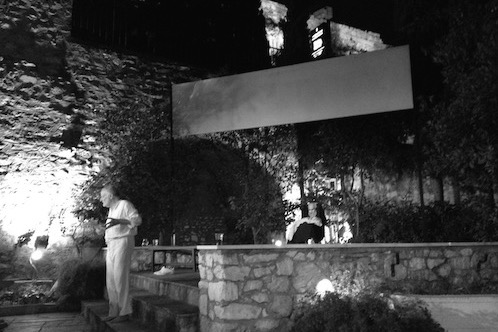Did the poor bastard die for something?
That was the opening question of actor Yannis Simonides in the Q & A session after the performance of Socrates Now I went to on Saturday- the night that Syriza was to put to the vote its decision to call a referendum on austerity measures. I had walked through the winding streets of Plaka to the beautiful courtyard of the Athens University Museum. What a night to sit beneath the Acropolis and reflect on the words of the philosopher as he faced those who, should he be found guilty, had the power to take his life.
Charged with religious nonconformity and corrupting the youth, Socrates appeared before a jury of 501 Athenians in an open-air court and gives account of his life and his work. Listening to Socrates set forth his arguments on virtue, justice, politics and corruption it seemed that finally, I could breathe. The day had been a frenetic one – the prime minister Alexis Tsipras’ announcement in the early hours of Saturday morning that there would be a referendum had taken many by surprise – and ensured that most of the city was glued to social media and news channels throughout the day – as @irategreek perfectly summed up:
I can't speak for other areas but in Kallithea it's business as usual – except for the sound of Parliament TV out of every window. #Greece
— Theodora Oikonomides (@IrateGreek) June 27, 2015
As it turned out, at around 3am Sunday morning, Syria won the vote and the Greek parliament agreed to the 5 July referendum, prompting the finance minister Yanis Varoufakis to tweet:
Democracy deserved a boost in euro-related matters. We just delivered it. Let the people decide. (Funny how radical this concept sounds!)
— Yanis Varoufakis (@yanisvaroufakis) June 26, 2015
Here, in this tiny courtyard, the apparent unassailability of the rich and powerful interests arraigned against him loomed large, stoking the frustration I had been feeling during my short time in Athens, the sense of agitation that the voices of justice and truth can are so often drowned out, neutralised in the discourse about Greece. But it was also heartening to see Socrates refuse to recognise the validity of that power, or play the game. Although fully aware of the manipulations and devices that would secure him a favourable verdict, he remained true to his ideals. This “playful, naughty, unspoilt child”, as Simonides described him, ultimately preferred death than acquiescence to those who valued money and power above all else.
Socrates’ priority was to remain faithful to the vocation he believed came from the gods – to “sting” the powerful and wealthy and “prod” their minds, so he refused any deals that would require him to shut up and go into exile. Even when facing death, he couldn’t be persuaded to flee because the freedom offered him had been secured by bribes.
Prompted by Simonides’ question of whether Socrates’ death achieved anything, the discussion moved from the current situation in Greece, and the democracy deficit around the world, on to what we can expect to achieve up against the powerful forces of our time. Much of the focus was on the power of the individual to make a difference in their encounters – with others, in their community and work – we can’t expect to change the world, a teacher from the US said.
On one hand, I don’t disagree with this perspective, or at least agree that focusing on ‘changing the world’ can be a form of procrastination. But on this night in Athens, I didn’t want to accept what was inferred – that little could be done to reign in the power of the corporations and the economic elites. Or that a democratically elected government can be prevented from carrying out its mandate, because it doesn’t fit with the dominant economic ideology? Is there really nothing that can be done in the name of goodness, truth or justice for Greece, nothing that we can hope to do to hold the IMF or the ECB accountable, or to challenge TTIP or halt climate change?
But then doesn’t Socrates show us that what he called an ‘examined life’ is, by its very nature, an affront to the power structures, because it involves a refusal to acknowledge or live by the very things that shore up their power? His desire to provoke, challenge and question the rich and powerful elite made him enemies, and when they came after him, Socrates refused to act to save his life by abandoning his ideals, arguing that it keeping oneself from evil was the really difficult thing. In doing so he challenged even their power over life and death – the very foundations on which the whole edifice was built. Perhaps the question we should ask is not if it is worth it, but if it is possible to live what Socrates defined as a virtuous life without provoking violence from a system that draws its power from a very different credo.

Leave a Reply
You must be logged in to post a comment.